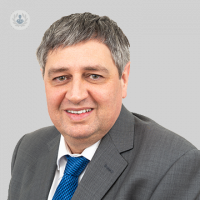Do I need back surgery?
Escrito por:Back surgery is always a potential option in the treatment of patients with back pain and sciatica (leg pain) but in the vast majority of cases, a conservative approach should be adopted initially and only in patients where the conservative options have been exhausted should surgery be considered. Leading Manchester orthopaedic surgeon Mr Andrew Fitzgerald explains more on treating back pain and what happens during spinal surgery…

How is back pain treated?
The treatment of back pain and sciatica involves a multi-factorial approach with physiotherapy and hydrotherapy treatment. Pilates and yoga can be helpful in the longer term. The use of injections such as epidurals, nerve root blocks and facet joint injections can be very helpful in relieving pain so that patients can progress with physiotherapy and also hydrotherapy treatment. These allow symptoms to settle and prevent the need for open spinal surgery.
What does spinal surgery involve?
In the majority of cases a conservative approach will be successful and only in a small percentage will surgery be required.
Surgery involves a general anaesthetic and usually requires an overnight stay.
The commonest procedure in the lower back is a discectomy, which is for patients with referred pain radiating down the leg and/or weakness in the leg. The procedure involves removal of the bulging portion of the disc, which is pressing on the nerve within the spinal canal causing the leg pain. The patient is placed on their stomach and a small incision is made in the back and the muscles are retracted to expose the bone and ligamentum flavum (a supporting ligament). A small window is made in the ligament to expose the spinal canal and the nerves are identified and the bulging or herniated disc fragment causing the compression is removed so that the nerve is lying freely.
The other common procedure in the lower back is a decompression of the spinal canal or foramen (where the nerve leaves the spine) and this again is to relieve compression on the nerves due to stenosis or narrowing in these areas. This problem is common in patients as they get older due to degenerative changes in the spine which can cause a reduction in the space for the nerves.
The presentation of this problem is usually a slow progression of symptoms with gradually increasing symptoms, either of back pain or leg pain, and weakness, particularly with walking. Patients find that the distance they can walk gradually reduces before the symptoms come on at which stage they will often need to sit down and rest.
Surgery for this problem involves decompressing the spinal canal which involves removal of bone (laminectomy) and bony spurs and thickened soft tissues which are causing the narrowing/stenosis.
How long does it take to recover from spinal surgery?
The recovery from spinal surgery depends on the type of surgery but discectomy and decompression surgery are usually done as an overnight stay being able to go home the day following the procedure. After the surgery, you will be up and about immediately and then under guidance from physiotherapy will increase activities over the next 4-6 weeks. Return to work is usually between 6 and 12 weeks depending on how strenuous your job is.
What is the success rate of spinal surgery?
The success rate for discectomy and laminectomy/decompression surgery is between 80-90%.


